Custom Software Development: UK’s Perspective & Local Trends

Despite the huge number of off-the-shelf software solutions that are as plentiful as stars in the sky, it might happen that you can’t find the one that meets your every business need. If that’s the case, you may need to build a bespoke solution from scratch or rework the existing one to match your requirements. And it would be a wise decision given our current realms where the right software can be a decisive factor in business success. That’s why custom software development UK is the most sought-after type of development right now.
Dominating a market niche is difficult; dominating a market niche in the UK is twice as difficult. And without powerful software systems, it’s next to impossible. The value of custom software application development is clear, but what exactly does it entail, and how do you choose a reliable service provider? In this guide, we’ll highlight key considerations and offer practical tips on how to secure the right tech partner.
from 25 countries outsourced software development to Relevant
We provide companies with senior tech talent and product development expertise to build world-class software.
What is Custom Software Development?
Let’s clarify what custom software product development truly involves to ensure we’re on the same page when discussing it and don’t confuse it with other types of development.
Custom software development is a full-fledged development that involves the ideation, design, development, deployment, and maintenance of a software product targeting a specific group of users. Such a kind of software solution tackles a unique set of challenges you throw its way and can be built either in-house or by outsourcing software development. Bespoke software isn’t intended for resale as its functionality and business logic are constructed to meet the precise needs of a particular organization.
For example, an off-the-shelf solution like Salesforce offers a broad range of customer relationship management (CRM) features suitable for many different types of businesses. In contrast, a custom-built CRM, let’s say for a healthcare provider, would include more specialized features, such as patient management, appointment scheduling, and others, to be relevant to the healthcare industry.
Custom vs. Off-the-shelf Software Solutions
There are a lot of differences between custom-built and generic solutions, which you should understand to pick the right one for your business needs.
Custom software solutions
Commonly referred to as bespoke or tailor-made, custom software, as we already have figured it out, is built to fulfill your certain business objectives. From this, it follows the benefits like:
- Perfect Fit: Tailored to your unique processes and workflows.
- Scalability: Can grow and adapt alongside your business.
- Integration: Can work smoothly with other tools and systems you use.
- Competitive Advantage: Create features that highlight your unique value proposition.
On the other hand, the development of bespoke software is a heavy investment (certainly several times more expensive than ready-made software). Also, take into account that the development of one-of-a-kind software for your business may be lengthy. The typical range of custom development is 4-9 months and will depend on your project’s complexity. What’s more, the unique nature of bespoke software often means you might find yourself committed to a support contract with the development company.
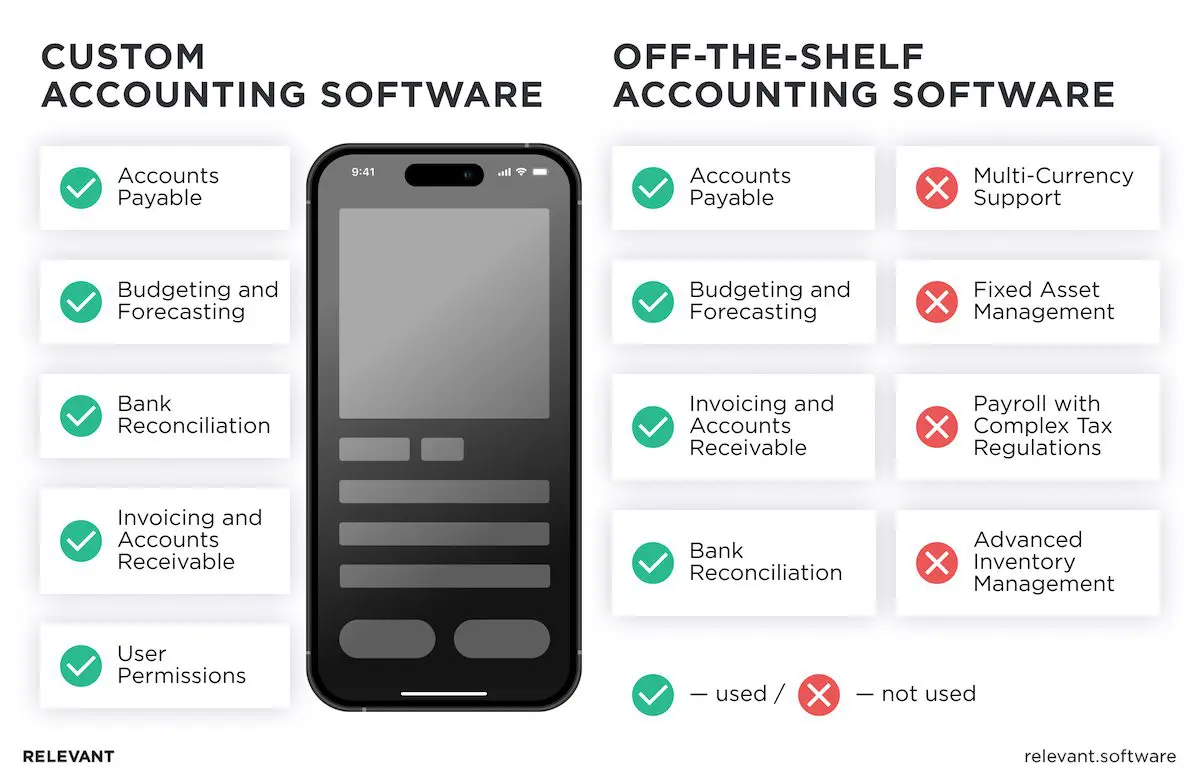
Off-the-shelf software
Software products that are packaged or ready-made and freely available in the market are referred to as commercial off-the-shelf software (COTS). Asana, Zoho, Salesforce, WordPress are some of the popular COTS applications many businesses use and find them valuable due to:
- Cost-effectiveness: Lower upfront cost compared to custom development.
- Faster Implementation: Ready-made software can be up and running quickly.
- Easiness to Use: Generally user-friendly interfaces with readily available support.
- Reliability: Tested by many users, which reduces the likelihood of major bugs.
- Support and Updates: Regular updates and support are usually provided by the vendor.
The downside is that sometimes, off-the-shelf software might not meet all your specific requirements. It could miss some of the important features you really need and offer the ones you don’t use at all. So, you’ll pay for features that are of no use. Generic software solutions have limited customization opportunities, and you might need to adapt your processes to fit the software rather than the other way around.
| Feature | Custom software | Off-the-shelf software |
| Cost | Higher initial investment | Lower initial investment |
| Implementation | Takes time and planning | Quick setup and deployment |
| Customization | Fully customizable to your needs | Limited |
| Scalability | High | Low |
| Integration | Easy integration with current systems in use | Limited integration capabilities |
| Support and Maintenance | Requires dedicated support and updates | Vendor-provided maintenance |
| Competitive Advantage | Unique features tailored for your business | Common features used by many businesses |
Custom Software Development in the UK
The UK is a tech titan in its own right. Globally, it holds the third spot for venture capital investment and houses around 160 unicorns, along with more than 27,000 funded startups. So, it’s no wonder that custom software development UK sector is huge, rich, and prosperous. Due to the government’s heavy investment in infrastructure, skilled tech talents, and thriving startup scene, the country is perfectly positioned to become a global leader in bespoke software solutions.
All those startups that pop up almost every day seek reliable tech partners that would help them realize their ideas and build market-winning digital products. At the same time, established UK enterprises with a hundred years of history also seek custom software development services to modernize operations and stay competitive. While businesses from every industry would benefit from tailor-made digital solutions, here are a few sectors that thrive on bespoke solutions:
- FinTech. Great Britain is a leader in financial technology, and custom financial software development plays a crucial role in creating secure, innovative applications for banking, payments, and wealth management.
- Retail. UK retailers leverage custom ecommerce software development services to personalize the shopping experience, optimize inventory management, and build robust e-commerce platforms.
- Manufacturing. Bespoke solutions streamline production processes, improve data analysis, and optimize resource allocation, which gives UK manufacturers a competitive edge.
- Healthcare. With a focus on patient care and data security, healthcare custom software development helps create innovative solutions for electronic health records, telemedicine, and medical research.
- Logistics & Supply Chain. Custom software empowers UK logistics companies to optimize delivery routes, manage inventory efficiently, and track deliveries in real time.
Choosing a Custom Software Development Partner in the UK
The custom software development UK scene is a vibrant hub that brims with skilled developers. As the 2023 Global Talent Competitiveness Index states, the United Kingdom ranks 10th out of 134 countries on its ability to attract and retain top tech talent.
Yet, due to the high demand for qualified software engineers, hiring one in the UK is nothing short of miraculous. And even if you manage to find good developers in Britain, their rates can be quite hefty. Yes, the UK’s robust tech scene comes with a price tag, and developer salaries often reflect that. That’s why many UK companies prefer to outsource software development to Eastern Europe as a more attractive alternative. In addition to more pleasant rates, the wide selection of niche experts and a strong work ethic are the main reasons UK businesses choose this region to fulfill their custom software development needs.

Key Considerations When Selecting a Developer
As you can see, your options for a tech partner are wide, but how do you find the one you can entrust your project to? Here’s a checklist of key considerations that would help you choose a reliable custom healthcare software development company for your needs:
- Expertise. Does your potential partner possess the specific technical skills and experience to successfully complete your project? (e.g., expertise in mobile app development, integration with legacy systems, etc.)
- Communication. Can they clearly explain complex concepts and maintain a transparent information flow throughout the development process?
- Portfolio. Do they have a proven track record of success with projects similar to yours? Check their portfolio for relevant work and client testimonials.
- Methodology. Does their development approach align with your needs (e.g., Agile vs. Waterfall)?
- Cost and Value. While cost is a factor, prioritize value for money. Look for a partner who offers competitive rates but also understands your business goals and delivers solutions that drive ROI.
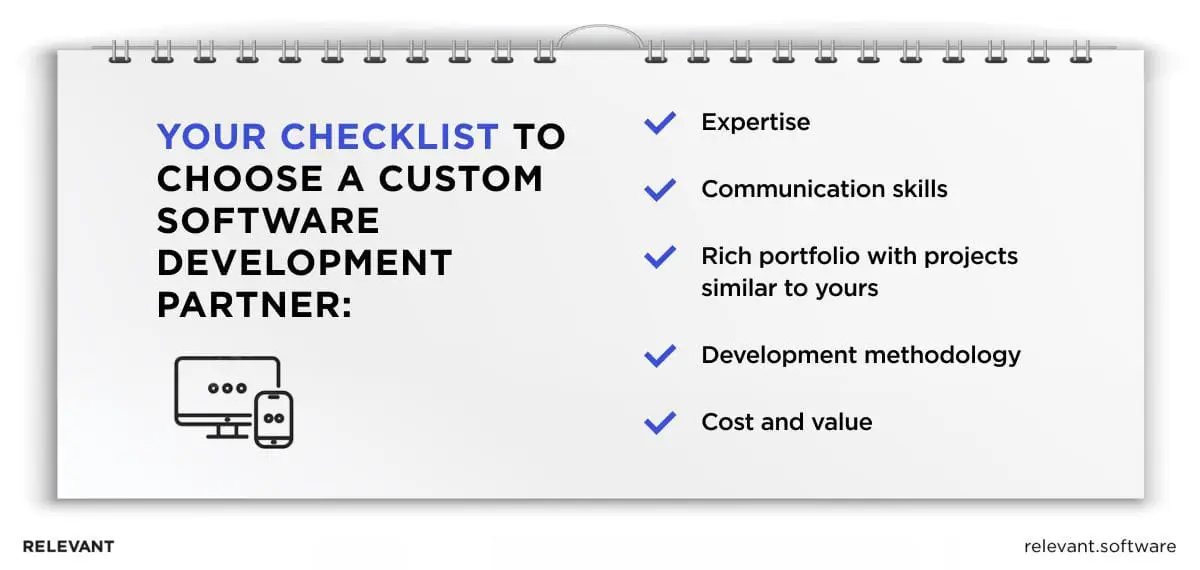
One more critical aspect that we would like to emphasize in custom software development UK is the importance of local expertise. A partner who understands the nuances of the UK business environment and regulations can be a game-changer, even if you collaborate with an Eastern European development team. Here’s why local expertise makes a difference:
- Regulatory Landscape. The company will be well-versed in UK-specific regulations and data privacy laws (e.g., GDPR), so you can be sure that your software is compliant.
- Local Market Knowledge. A local partner or one from a nearby country can better understand your target audience and tailor the software’s user experience accordingly.
- Seamless Collaboration. Time zone alignment and proximity facilitate smoother communication and collaboration.
Cost and Budgeting for Custom Software Projects
Custom software application development is an investment in your business’s future. But how much might it cost? Unlike off-the-shelf software tools that charge a fixed price, custom development requires a more nuanced approach to budgeting. It’s difficult to pinpoint a definitive cost as it depends on more than one factor. However, there’s a general range to give you a starting point:
- Simple Projects: £10,000 – £50,000 (basic mobile apps, internal tools, or simple website functionalities.)
- Medium-Sized Projects: £40,000 – £90,000 (e-commerce platforms, content management systems, or CRM software.)
- Complex Projects: £90,000 – £200,000+ (enterprise-level applications with extensive integrations, complex functionalities, or high-security requirements.)
Factors that Influence the Cost:
Several variables play a role in determining the final cost of your custom software development UK project:
- Project scope and complexity. The more intricate features and functionalities you require, the more time and resources are needed, which means higher costs.
- Development team expertise. highly skilled developers with specialized experience are recruited at a premium compared to junior developers.
- Project timeline. If you need to develop a project quickly and on a tight deadline, the development team might need to work overtime, or you will need more developers to work on your project, which increases development costs.
- Development methodology. Agile development with shorter sprints may lead to incremental costs throughout the project, while a more traditional Waterfall approach might have a fixed upfront cost.
- Post-launch support. Factor in the costs of software updates and maintenance after launch.
The Custom Software Development UK Process
Be it software engineering, mobile app development, or website creation, the software development process will be broadly similar and differ slightly depending on the development methodology. We stick to the agile approach since it allows for faster iteration and adaptation, crucial factors for custom software development UK projects that often involve frequent requirement changes or market adjustments. In any case, a good custom business software development partner will work closely with you at every stage of the entire development process that involves:
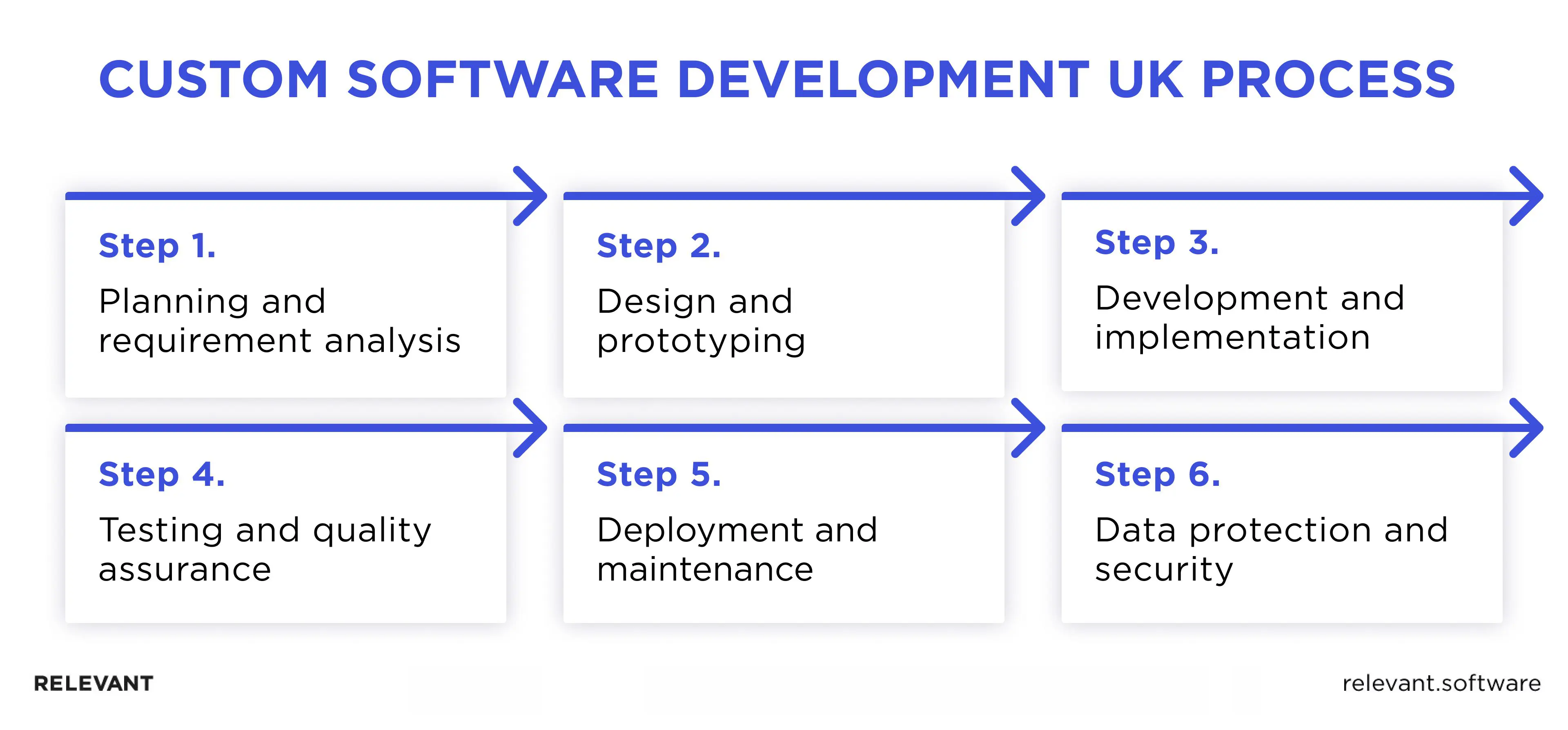
Planning and Requirement Analysis
At this phase, your partner will help you define the project’s scope (its core features and limitations), analyze requirements, and gather detailed information about what the software needs to do. Workshops and user interviews help unearth user needs and pain points, while tools like user story mapping and wireframing visually represent the software’s functionality and user flow. Close collaboration and complete mutual understanding at this stage is especially important.
Design and Prototype Creation
Once the roadmap is clear, the development team will move on to create both the software’s architecture – its internal structure – and the user interface (UI), the visual elements users interact with. Usability and a user-centered approach are key here if you want to build a user-friendly app that caters to the target audience. Then, a team will create prototypes, which are basically interactive mockups, often low-fidelity, that allow for user testing and feedback. Thanks to prototypes, you can polish the design and find and fix potential roadblocks before developers begin to code, which means fewer costly surprises down the line.
Development and Implementation
Here, the design of the software that you would approve translates to code. Skilled remote developers like the ones you can find at Relevant will follow best practices and make use of industry-standard environments to write clean, maintainable code. From our experience, here are some best practices you can use to produce quality code:
Test-Driven Development (TDD) approach involves writing unit tests before writing the actual code. These tests define the expected behavior of the code, which helps catch errors early in the development process and ensure functionality works as intended.
Continuous Integration and Continuous Delivery (CI/CD) is another good practice that automates the creation, testing, and deployment of code. With CI/CD, changes are merged frequently, which results in faster development cycles, earlier detection of bugs, and a more streamlined release process.

Testing and Quality Assurance
After the code is written, the software needs to be thoroughly tested to ensure the backend, frontend, and all components function as intended. For that reason, custom software product development companies usually carry out different types of tests:
- Unit testing to verify individual code modules work correctly in isolation.
- Integration testing to ensure different software components communicate and function seamlessly together.
- System testing evaluates the entire software system against the defined requirements.
- Finally, acceptance testing allows stakeholders to confirm the software meets their expectations and business needs.
Deployment and Maintenance
Now, your software is ready for rollout. One of the most commonly used deployment strategies is a staged rollout to a limited group first, which lets you identify and fix any last-minute issues before a wider release. Or you can opt for a blue/green deployment, where you run the new version alongside the existing one so you can switch users over gradually and roll back to the old version if any critical issues arise.
Often underestimated, continuous software maintenance is equally important for its long-term success. To keep your custom digital product in good shape, you’ll need to fix bugs, update security patches, enhance current features, add new ones, and so on.
Data Protection and Security Measures
With user data often at stake, security is paramount. Custom software development for small businesses in the UK must adhere to strict regulations like GDPR and the Privacy and Electronic Communications Regulations (PECR), to name a few. Beyond compliance, data encryption and secure authentication are a must for any application to protect sensitive data. So, make sure the developers you cooperate with implement strong security measures.
Trends and Innovations in Custom Software Development UK
The UK tech scene is one of the riches, so the adoption of new technologies and methodologies here is really fast. Here are some key trends that will shape the future of custom development:
- Agile and DevOps Integration. Gone are the days of rigid development cycles. The UK companies embrace Agile methodologies that allow for flexibility and rapid iteration based on user feedback. This is often coupled with DevOps practices, which automate tasks and streamline communication between development and operations teams. As a result, you get faster software delivery and quicker time-to-market.
- AI and Machine Learning (AI/ML). AI and ML transform whole industries and processes thanks to their two main superpowers: automation of routine tasks and quick analysis of incredibly huge sets of data. In the context of software development, they can automate virtually any process (code generation, bug detection, security vulnerability assessments, and so much more). Similarly, AI can improve user behavior analysis, which will let teams create more intuitive and user-centric software designs.
- Cloud Computing. Cloud platforms have become the go-to infrastructure for custom medical software development in the UK. Cloud offers scalability, cost efficiency, and easier collaboration. Developers can access powerful resources on demand and don’t worry about physical infrastructure management, while they can build and deploy software faster.
Our Case Studies
As a custom software development company that has deeply integrated with the UK market, we have successfully delivered a number of tech solutions for our clients from Britain. Here are a few examples that showcase our experience, competency, and collaborative approach:
FirstHomeCoach
We partnered with this UK-based fintech company to develop a SaaS platform that simplifies the home buying process for first-time buyers. Our team built a custom algorithm and recommendation engine to create personalized property buying plans, analyze costs, and connect users with trusted advisors for mortgages, insurance, and legal services. This secure platform helped over 5,000 users navigate property purchases in its first year, processing over 40,000 data points.

Optimum Pay Group
We collaborated with this UK-based financial services provider to develop a cloud-based international payroll solution. Our team created a secure payment gateway using secure code practices and tokenization to protect financial data. We integrated features like user management, staff dashboard, and report generation while our UI/UX designers developed an intuitive interface that simplifies payroll services for customers.
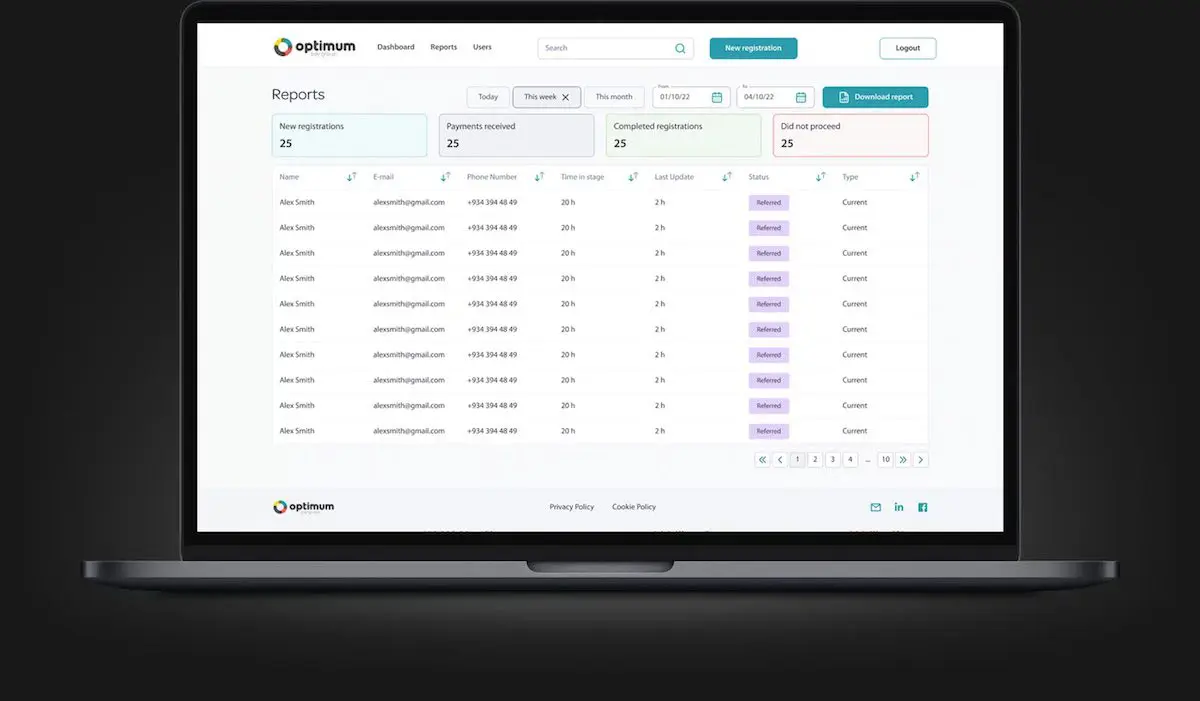
Return2Play
Our team helped this UK company create the HIPAA-compliant app, Return2Play, that streamlines athlete recovery management. We developed features like injury reporting, doctor appointment scheduling, and player management, all of which simplify communication between coaches, players, and medical professionals. To ensure decent app security, we implemented input validation and data encryption measures as well as compliance with industry regulations.
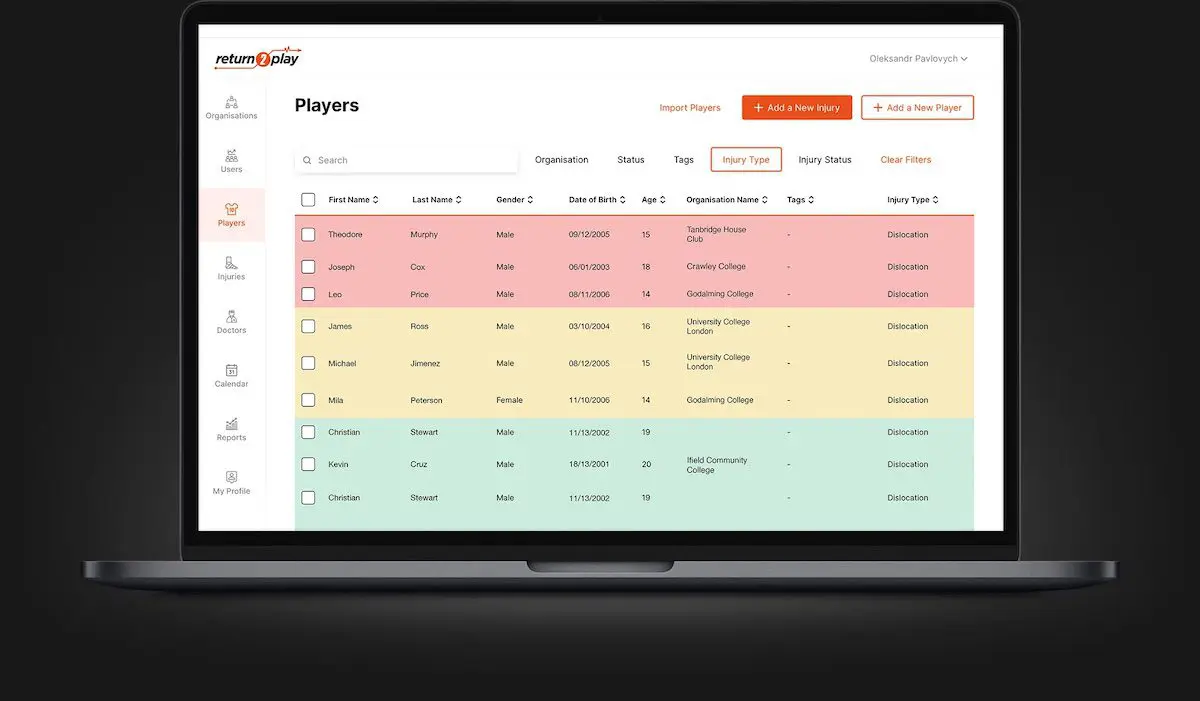
Partner with Relevant for Custom Software Development
If you see that off-the-shelf software tools meet only 60% or less of your company’s operational needs, why waste time and money when a custom solution can be built to address all your pain points? Yes, the path of custom development might seem thorny, but with the right partner and effective strategies, it’s easily achievable.
At Relevant, we offer custom software development services for UK companies that seek experienced software engineers with knowledge of the latest technology and, most importantly, of the local market. Whatever your project requirements, we have the best talents with relevant skills and experience. We know all the ins and outs of product development services and will closely cooperate with you to deliver a solution that ticks all the boxes:
- addresses your specific needs
- integrates effortlessly with your current systems
- complies with all relevant UK regulations.
Contact us to discuss your software needs!


Hand-selected developers to fit your needs at scale! Let’s build a first-class custom product together.

